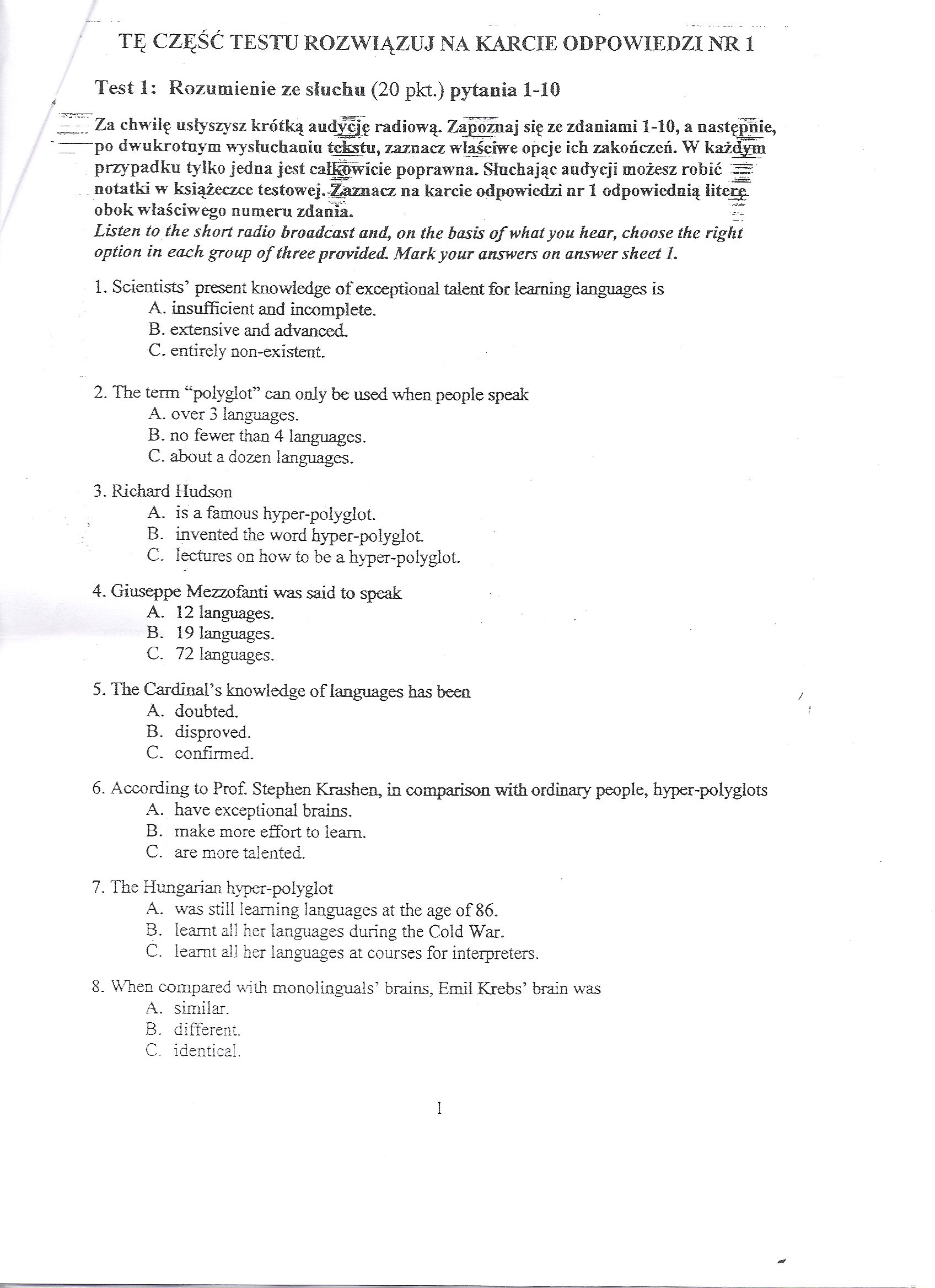Scan2 (20)

TĘ CZĘŚĆ TESTU ROZWIĄZUJ NA KARCIE ODPOWIEDZI NR 1 Test 1: Rozumienie ze słuchu (20 pkt.) pytania 1-10
Za chwilę usłyszysz krótką audycję radiową. Zapoznaj się ze zdaniami 1-10, a następnie, po dwukrotnym wysłuchaniu tekstu, zaznacz właściwe opcje ich zakończeń. W każdym przypadku tylko jedna jest całkowicie poprawna. Słuchając audycji możesz robić gy notatki w książeczce testowej.Zaznacz na karcie odpowiedzi nr 1 odpowiednią literę obok właściwego numeru zdania. i-
Listen to the short radio broadcast and, on the basis of whatyou hear, choose the right option in each group of threeprovidecL Markyour answers on answer sheet 1.
1. Scientists’ preseni knowiedge of exceptional talent for leaming languages is
A. insufficient and incomplete.
B. extensive and advancecL
C. entirely non-existent
2. The term "polyglot” can only be used when people speak
A. over 3 languages.
B. no fewer than 4 languages.
C. about a dozen languages.
3. Richard Hudson
A. is a famous hyper-polyglot.
B. invented the word hyper-polyglot
C. lectures on how to be a hyper-polyglot.
4. Giuseppe Mezzofanti was said to speak
A. 12 languages.
B. 19 languages.
C. 72 languages.
5. The CardinaTs knowiedge of languages has been
A. doubted.
B. disproved.
C. confirmed.
6. According to Prof. Stephen Krashen, in comparison with ordinary people, hyper-połygłots
A. have exceptional brains.
B. make morę effort to leam.
C. are morę talented.
7. The Hungarian hyper-polyglot
A. was still leaming languages at the age of 86.
B. leamt ail ner languages during the Cold War.
C. leamt all her languages at courses for inteipreters.
8. When compared with monolinguais' brains, Emil Krebs’ brain was
A. similar.
B. different.
C. identical.
1
Wyszukiwarka
Podobne podstrony:
new 2 (5) EGZAMIN KOŃCOWY Z JĘZYKA ANGIELSKIEGO NA POZIOMIE B2TĘ CZĘŚĆ TESTU ROZWIĄZUJ NA KARCIE ODP
new 8 (5) PONIŻSZĄ CZĘŚĆ TESTU ROZWIĄZUJ NA KARCIE ODPOWIEDZI NR 2 3.4. pytania 61
img080 (40) EGZAMIN KOŃCOWY Z JĘZYKA ANGIELSKIEGO NA POZIOMIE B2 TĘ CZĘŚĆ TESTU ROZWIĄZUJ NA KARCIE
angB02 EGZAMIN KOŃCOWY Z JĘZYKA ANGIELSKIEGO NA POZIOMIE B2 TĘ CZĘŚĆ TESTU ROZWIĄZUJ NA KARCIE ODPOW
img119 (17) 2X LjUEGZAMIN CERTYFIKACYJNY Z JĘZYKA ANGIELSKIEGO NA POZIOMIE B29 czerwca 2008 TĘ CZĘŚĆ
CZĘŚĆ TEORETYCZNA - ZAZNACZ PRAWIDŁOWĄ ODPOWIEDŹ NA KARCIE ODPOWIEDZI ZAD. 1 Edytor tekstu to progra
więcej podobnych podstron